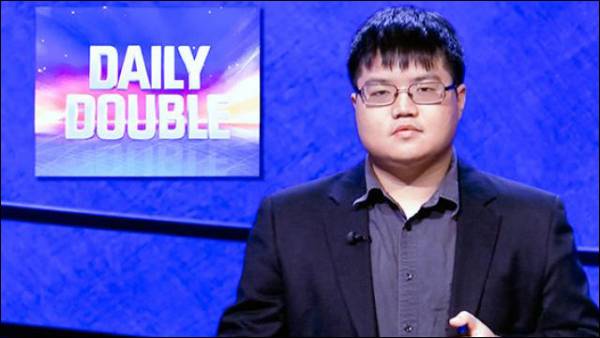G911 Talks to Math Whiz Who Helped Art Chu Win $300k on ‘Jeopardy’

It's no secret among gamblers that having good mathematical skills can help when gambling.
Whether it's counting cards at blackjack, handicapping the horses or figuring out the pot odds in poker, a math whiz has an edge.
What's not so well-known is that math skills can also help out on a TV game show such as Jeopardy!, where betting is an integral part of the game.
In addition to knowing trivia, Jeopardy! contestants have to make wagers when they hit a Daily Double or get to Final Jeopardy!
So when Jeopardy! contestant Arthur Chu earlier this month won 11 games in a row on the popular TV game show to become the third winningest Jeopardy! contestant ever, earning a total of $298,200, one of the people he credited with helping his success was math whiz Keith Williams, who himself is a former Jeopardy! contestant.
Williams, who studied economics and game theory at Middlebury College in Vermont and lives in New York City, was on Jeopardy! about 10 years ago and won $60,000 and a car.
Still a Jeopardy! enthusiast, Williams runs a website called The Final Wager (www.thefinalwager.co) that discusses all things related to the strategy of playing Jeopardy!, with heavy emphasis on how to go about making your wager for Final Jeopardy!, the game's climax which usually decides the winner.
After his winning streak came to an end, Chu, of Cleveland, in numerous media interviews credited Williams and his website with helping him develop the strategy that helped him win on Jeopardy!
Chu used some unconventional strategy when competing on the show, including excessive bouncing around among categories, selecting clues out of order, usually betting double or nothing on Daily Doubles and, most famously, when calculating his wager for Final Jeopardy!, playing for a tie and not a win.
Knowing its readers are ALWAYS looking for an edge, Gambling 911 this week contacted Williams--the genius behind the genius--and asked him about his website, Chu and whether his considerable math and game theory skills help him out in gambling.
Here is a transcript of that interview:
Gambling 911: How did it come about that Arthur Chu came to you for advice on Jeopardy! strategy?
Keith Williams: When Arthur got the call telling him he'd be on the show, he had only a month to prepare. He figured he'd better his chances by focusing on strategy than by cramming knowledge beyond the topics that appear most often, such as world capitals and Shakespeare. He put "Jeopardy strategy" into Google and found my site, the only one that breaks down Final Jeopardy! wagering into methodical steps as opposed to algebraic formulas.
G9: Can you explain the "play to tie, not win" strategy for Final Jeopardy! that you recommend?
KW: Every player should have just one goal--to return the next day. You do this by winning or by tying. With that goal in mind, there are two strong reasons to wager for the tie. The first is based on game theory. Adding the extra dollar won't benefit you if you're right--you'll either win or tie no matter what--but it could hurt you if you're wrong. This concept is called dominance--one decision will always have a higher return than another. Most players know the leader is supposed to wager to win by a dollar, and some will position themselves to finish just ahead of the leader if he gets it wrong. We saw this the other night when one player wagered to finish with $2,400 and the leader wagered to finish with $2,399. The second reason is a Jedi mind trick of sorts. If you're leading, and your opponent is close enough, he should wager so that if you get it wrong, he'll win no matter what. This means you'll win only if you get it right. If this opponent knows you're going to offer him the tie, however, he might wager everything in an attempt to cash in on your generosity. In this case, you now have an additional way of winning--if you both get it wrong. If we consider this in terms of random coin flips, you'll now win 75% of the time as opposed to just 50% of the time.
G9: What is your strategy for playing a Jeopardy! Daily Double?
KW: The general consensus is players tend to be overly conservative on Daily Doubles, particularly late in the game. Some are afraid to lose their lead in an attempt to put the game away before Final Jeopardy!, and it often comes back to bite them. I've done a few videos talking about how players should wager when they find the Daily Double on the last clue in Double Jeopardy!
G9: What is your math background?
KW: I graduated from Middlebury College in 2007 with a degree in economics. My focus was on game theory and experimental economics. I worked in finance for several years before switching to writing full-time. I'm now consulting for a few companies who want to use my ability to convey complex information in simple terms, as I do on The Final Wager, to help their own communications strategies. I was the 2003 Jeopardy! College Champion and made appearances in two subsequent tournaments. In all, I took home $60,000 and a 2004 Volvo S60R, which I still have.
G9: Do you ever use your math and game theory skills to gamble, and if so, how's that working out?
KW: I played a lot of online poker in college and after and made some nice spending money there. When I go to the casino these days, I usually set up shop at the blackjack table, but I don't count cards--wink, wink. I've been known to play craps as well. I find games against the house provide a better experience, since you can cheer for others' victories as well.
By Tom Somach
Gambling911.com Staff Writer














